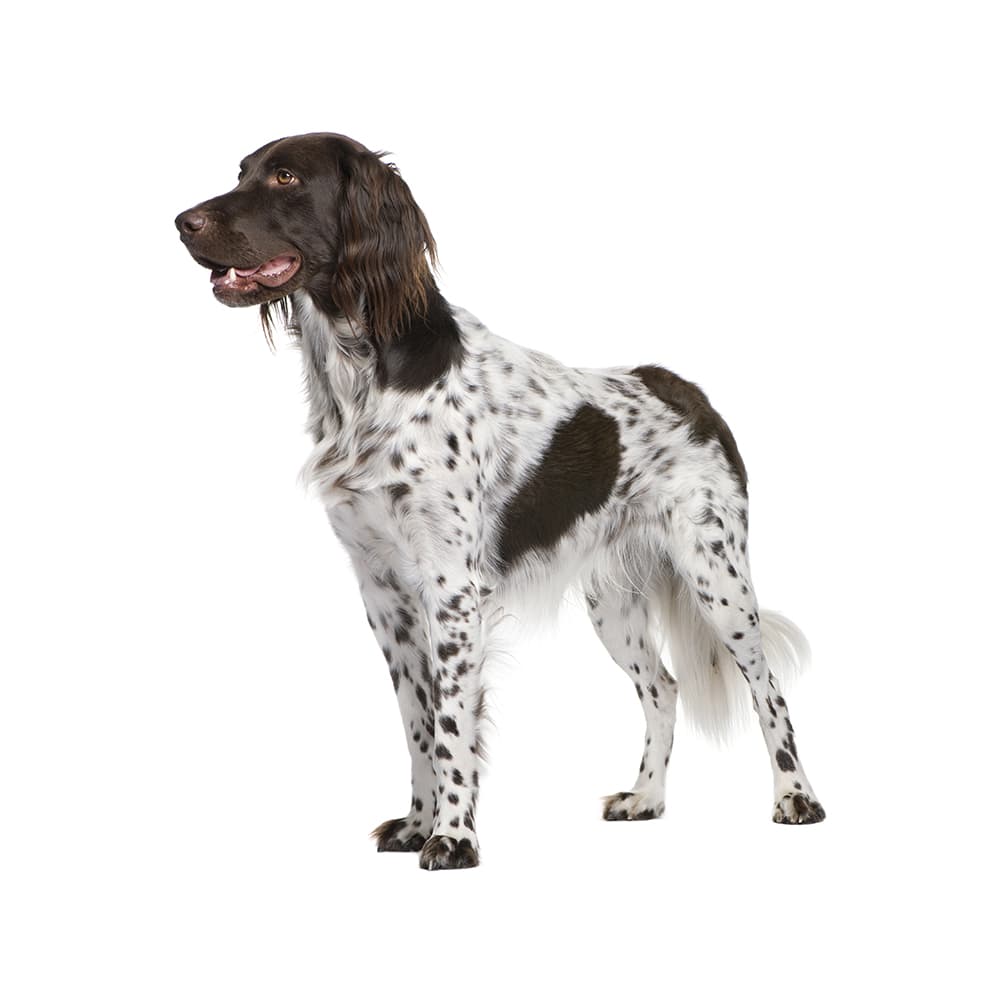Discover your dog's connection to this breed and 200+ others


Discover your dog's connection to this breed and 200+ others



The Small Munsterlander, also known as the Small Munsterlander Pointer or Kleiner Münsterländer, is a versatile hunting dog breed. It originates from the Münster region in Germany and is recognized for its exceptional hunting abilities, distinctive coat, and affectionate nature. The Small Munsterlander's history dates back to the late Middle Ages, when it was used in the Münster region of Germany for falconry, a form of hunting using birds of prey. It's thought that the Small Munsterlander Pointer, a breed skilled in tracking, pointing, and retrieving, was developed to aid in this task, flushing game for the falcons to catch. During the 19th and early 20th centuries, the breed's numbers dwindled due to changes in hunting practices, and it was only in the mid-20th century that the breed experienced a resurgence in popularity thanks to concerted breeding efforts by enthusiasts. The breed was recognized by the Fédération Cynologique Internationale (FCI) in 1955, but it remains less well-known outside of Europe
Small Munsterlanders are generally healthy dogs. However, degenerative myelopathy and progressive rod-cone degeneration are common genetic conditions from which many other dog breeds are known to suffer. As for all breeds, genetic screening is recommended to assist veterinarians with diagnosis and proactive care, as well as help breeders identify affected and carrier dogs.
The Small Munsterlander is known for being intelligent, energetic, and very trainable. This breed thrives on both physical and mental stimulation, and therefore, is well-suited to active families or individuals who enjoy outdoor activities. While they excel in hunting and field work, they're also affectionate and gentle family dogs. Small Munsterlanders are usually good with children and other animals, given proper socialization. Their high intelligence means they can be a little stubborn at times, so firm, consistent training is recommended.
A canine genetic lineage is a group of individuals or entire breeds that descended from common ancestors predating modern breed formation. Often these lineages are associated with a ‘type’ of dog with a unique historical working role and associated behaviors (e.g., herding, scent hunting, etc.).
The Pointer-Spaniel lineage encompasses both pointer and spaniel breeds. They were both bred for their specialized hunting abilities in Europe. Pointers locate game and freeze in a stance, called “pointing”, to indicate to their hunter that birds are close by. Spaniels were bred to find game in underbrush and retrieve it. Both pointer and spaniel breeds were bred to enhance their strong senses, trainability, and endurance as these are advantageous in a hunting partner. Spaniels and pointers are known for their strong work ethic, ability to work closely with humans and agility. These dogs’ ability to work closely with their hunters makes them an asset during a hunt because they follow direction well and know how their hunters want them to proceed.
Example breeds with ancestry from this lineage include English Cocker Spaniel, Irish Red Setter, and German Shorthaired Pointer.
Despite their name, Small Munsterlanders aren't that small! They typically weigh between 40 and 60 pounds, making them a medium-sized breed.
The breed's name is a bit of a misnomer: the "Munster" in their name is not derived from the large German city of Münster, but from the small town of Munster, located in Lower Saxony, Germany.
Although they're versatile hunters, Small Munsterlanders also have a strong retrieving instinct, making them excellent in water-based activities.
https://www.akc.org/dog-breeds/small-munsterlander/
https://vgl.ucdavis.edu/breed/small-munsterlander
https://www.fci.be/en/nomenclature/KLEINER-MUNSTERLANDER-102.html https://www.ukcdogs.com/small-munsterlander
Recommended by top vets with decades of experience
21 breeds
64 genetic health markers
50 genetic trait markers
